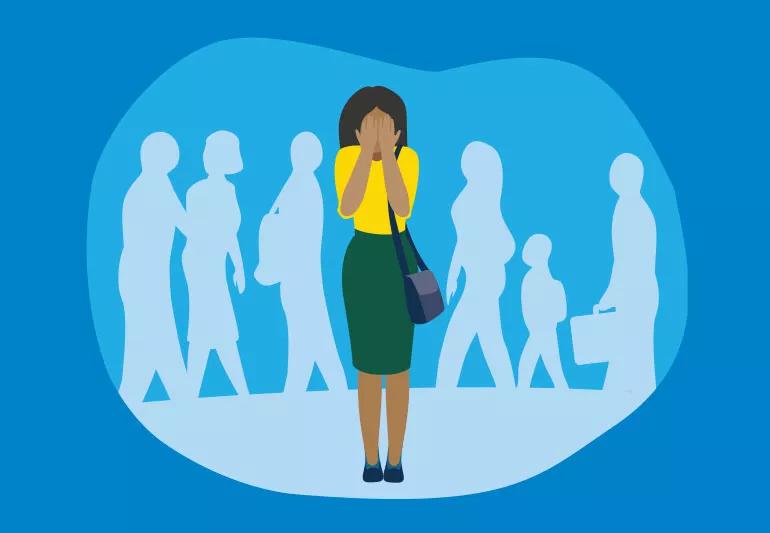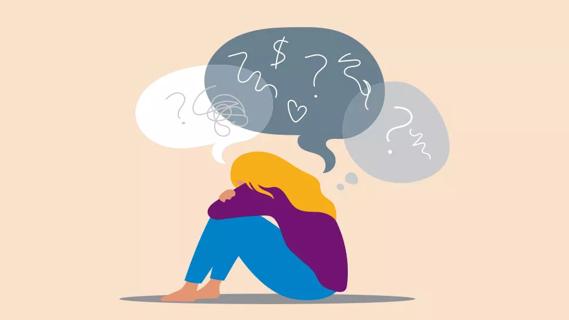Here's how you can address feeling overwhelmed or distressed in social situations

If you feel out of practice socializing after the last few years of social distancing, you’re not alone. If you feel more anxious than usual when leaving the house to socialize, that’s also totally normal, as is occasionally feeling overwhelmed or out of your element in large crowds.
Advertisement
Cleveland Clinic is a non-profit academic medical center. Advertising on our site helps support our mission. We do not endorse non-Cleveland Clinic products or services. Policy
However, when these nervous feelings persist — and cause you great anguish — you might have a social anxiety disorder.
“Social anxiety is one of those disorders where the name is pretty accurate in describing what it is,” says psychologist Dawn Potter, PsyD. “It’s anxiety that occurs in a social situation. If you have anxiety that routinely pops up in social situations that causes distress or inhibits you from doing things you want to do, then we might start to consider this a disorder. A person with social anxiety disorder would have frequent anxiety, panic or significant discomfort in a social situation. Then they would want to avoid that situation, or would enter that situation with a lot of distress.”
Dr. Potter adds that there are different kinds of social anxiety. While one involves being uncomfortable with or avoiding social situations — either big or small groups of people you might not know well, whether in public or private — there’s also a specific type of social anxiety around public speaking.
“It’s performance-based only,” says Dr. Potter. “You would have anxiety about public speaking, but wouldn’t necessarily have anxiety about going to a party, ordering at a restaurant or speaking on the phone to an unknown person.”
Advertisement
Contrary to popular belief, being quiet in social situations, or preferring to socialize in small groups, doesn’t mean you have social anxiety — and this disorder isn’t synonymous with being an introvert. “Even if extroverts are generally outgoing and talkative, and like meeting new people, they can also feel nervous, anxious or on edge when meeting new people and performing in front of groups,” says Dr. Potter.
Dr. Potter stresses that it’s important to address your social anxiety, even if this feels difficult since it can have a major impact on your life. “It can have subtle negative effects on your career, friendships, dating life, or even family relationships,” she says. “It can affect you so broadly when you miss opportunities. When a person’s isolated, it can lead to depression because you miss opportunities to have a good time or enjoy yourself, and feel connected to other people.”
Luckily, Dr. Potter notes that social anxiety is very treatable, although strategies for overcoming social anxiety depend both on your individual personality and how much the disorder is affecting your life. For example, if you have panic attacks when going out in public because you are so overwhelmed, you might opt for medication, psychotherapy or a combination of both. Less severe anxiety might be better served by a different treatment option.
Here are a few other ways to approach getting over social anxiety.
For those who have mild-to-moderate social anxiety disorder — for example, maybe it’s not causing you panic attacks — finding ways to practice public speaking is a good approach. Dr. Potter suggests joining a group such as Toastmasters, which is for specifically practicing public speaking and rehearsing.
Among the different kinds of psychotherapy available, cognitive behavioral therapy — which involves making changes to the way you think and feel about a situation, which, in turn, can help you modify your behavior — is a helpful way to approach social anxiety. “With social anxiety specifically, you want to identify patterns of thinking that cause you to avoid social situations — like if a person’s always expecting the worst outcome, or a person is fixated on the fact that someone might see them blushing, or sweating or stammering,” says Dr. Potter. “You want to help them learn to challenge those expectations and adopt more positive self-talk rather than negative self-talk.”
Dr. Potter recommends what she calls “situational exposure.” Identify certain social situations you’re afraid of, and work your way up from easier to more difficult scenarios while practicing relaxation techniques so you can tolerate anxiety. “For example, if you have a fear of large groups, and you’ve been mostly avoiding group activities, start by going out with a friend one on one,” she explains. “Then work your way up to going out with a small group of friends.” Repeat as needed until you feel more comfortable before attempting to go to a restaurant, a bar or a party where there would be more people. You can also work on situational exposure with the support of a therapist, Dr. Potter says. “Like cognitive behavioral therapy, exposure therapy is a type of treatment a trained psychologist can provide.”
Advertisement
It can be embarrassing or humbling to admit to people in your life that you’re anxious in social situations and might need help. However, letting a friend or loved one know you might need some extra support can be a major boost. “Many times, people are going to feel more comfortable if they’re in a social situation with somebody that they’re close to,” Dr. Potter says. “Especially if somebody has been fairly isolated in recent times, it can be helpful at first to have a buddy when you go back into a social situation.”
The key to this support is helping an anxious person become more independent over time. “Eventually, people with more generalized social anxiety will find it uncomfortable to go shopping or order food by themselves,” Dr. Potter explains. “You want to balance supporting a person and encouraging them to do it themselves.”
If you’re a friend or family member of somebody anxious in social situations, one way to offer support is to bring them into the conversation. “You might be like, ‘Oh, I think Sara has something she would probably like to say on that subject. She’s really interested in that,’” Dr. Potter says. “You can support them by bringing them out of their shells.” Before doing that, however, be sure to ask the person if that’s OK. “If you’re a person with social anxiety, you may not like being put on the spot to say something. Talk to that person in advance about how they want to handle certain things.”
Advertisement
When you’re out in public and start feeling anxious, it’s easy to spiral and become fixated on everything that appears to be going wrong, even if you’re the only one feeling that way. “In the moment, you need to focus outside of yourself and remind yourself, ‘This is probably anxiety. I can’t read their mind. I do not know what they’re actually thinking of me,’” Dr. Potter says.
This is easier said than done, of course, so she suggests using a technique called “five senses” that can help you regain perspective and stay in the moment. “Do a check-in with yourself of all of your five senses to get yourself more externally focused. Distract yourself from unpleasant internal sensations and negative thoughts,” says Dr. Potter. “Then you can try to refocus on: ‘What are they actually saying to me? What else is going on right now? What can I see? What can I hear? What can I feel?’”
If your social anxiety isn’t going away as fast as you’d like, that’s perfectly normal. “It might be that you moved too fast and need to spend more time practicing other social encounters before you’re up for the one you’re stuck on, or you need to work more on relaxation techniques and distraction techniques so you can tolerate that situation next time,” says Dr. Potter.
Advertisement
Analyzing after the fact what triggered a reaction, whether a panic attack or something else, can also help. “Try to break down, ‘How can I think about that differently?’ or ‘How can I change the situation next time?’” Dr. Potter suggests. “Let’s say you go to a concert and start to have a panic attack because you’re enclosed in by a lot of people. Maybe next time, you might sit in the back or on an aisle, or stay somewhere where you feel like there’s an exit route if you feel anxious or closed-in.”
Dr. Potter adds that other people are generally way more focused on themselves than they are on others. “They are most likely not scrutinizing your behavior in social situations, because they are busy thinking about what they are going to say or do next,” she says. “Your anxiety usually magnifies the negative and minimizes the positive — so the things you’re acutely aware of about yourself may not be particularly noticeable to others.”
Social anxiety disorders can also lead to physical symptoms. “You might experience blushing, sweating, or a subjective sensation of feeling suddenly cold or warm,” says Dr. Potter. “You might also have physical tension, which could cause aches and pains, like a stomachache.”
You can also experience symptoms associated with panic, even if you don’t have a full-blown panic attack. “Panic symptoms are your heart beating fast, shortness of breath, a subjective feeling of losing control or a fear of sudden, impending doom,” says Dr. Potter. “People with social anxiety will typically experience some of these symptoms, including at a lower threshold, too.”
Determining whether these symptoms are from anxiety, or a more serious medical condition can be difficult. “If the pain goes away quickly after the anxiety-provoking situation has stopped, and if you have a subjective sense of knowing that you are currently afraid of something, then it’s more likely what you are feeling is probably anxiety,” says Dr. Potter. “But if you’re in doubt, you should definitely talk to a doctor about it and get advice on specific signs to look out for and what your risk factors are.”
If you have a known heart condition, this advice is even more important. “You want to be much more careful about seeking medical care for any of these types of symptoms,” she says. “And if you have cardiac conditions and you have anxiety, you should talk to your doctor about how to differentiate the two.”

Sign up for our Health Essentials emails for expert guidance on nutrition, fitness, sleep, skin care and more.
Learn more about our editorial process.
Advertisement

Going home isn’t always easy, but there are ways to ease any stress you might feel

Managing stress can help you sleep more soundly

This fast-acting anxiety medication should never be taken with alcohol, despite what you may see on The White Lotus

Deep breathing, positive mantras and tackling negative thoughts can help get you out of your head and cool down your anxiety

Focusing on what you can see, feel, touch and hear can help you feel more present in the moment

Performance anxiety and stage fright are outsized stress responses that can creep up when you’re put on the spot

A healthy amount of anxiety can keep you safe from harm and motivate you to take action

Although different conditions, they can occur together or cause one another

Even small moments of time outdoors can help reduce stress, boost mood and restore a sense of calm

A correct prescription helps your eyes see clearly — but as natural changes occur, you may need stronger or different eyeglasses

Both are medical emergencies, but they are very distinct events with different causes